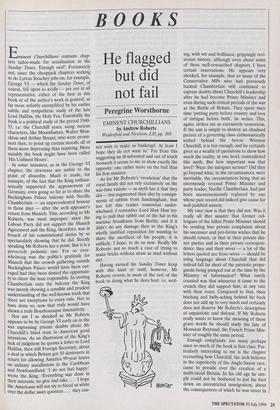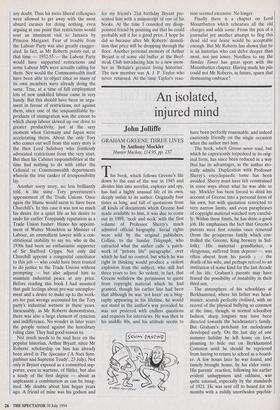He flagged but did not fail
Peregrine Worsthorne
EMINENT CHURCHILLIANS by Andrew Roberts Weidenfeld and Nicolson, 120, pp. 368 Eminent Churchillians contains chap- ters tailor-made for serialisation in the Sunday Times. Enough said? Fortunately not, since the cheapjack chapters seeking to do Lytton Strachey jobs on, for example, George VI — which the Sunday Times, of course, fell upon so avidly — are not at all representative, either of the best in this book or of the author's work in general, as far more reliably exemplified by his earlier subtle and sympathetic study of the late Lord Halifax, the Holy Fox. Essentially the book is a political study of the period 1940- 55, i.e. the Churchill years, using various characters, like Mountbatten, Walter Mon- ckton and Arthur Bryant, who were promi- nent then, to point up certain morals, all of them more depressing than inspiring. More suitably the book might have been called `His Unfinest Hours'.
In some instances, as in the George VI chapter, the strictures are unfair to the point of absurdity. Much is made, for example, of the fact that the King enthusi- astically supported the appeasement of Germany, even going so far as to share the Buckingham Palace balcony with Neville Chamberlain — an unprecedented honour in those days — after the arch appeaser's return from Munich. This, according to Mr Roberts, was most improper, since the Labour Party did not support the Munich Agreement and the King, therefore, was in breach of his constitutional duties by so spectacularly showing that he did. Strictly speaking Mr Roberts has a point. But it is a perversely pedantic one. For so over- whelming was the public's gratitude for Munich that the crowds gathering outside Buckingham Palace would have been out- raged had they been denied the opportuni- ty to cheer the man responsible. In inviting Chamberlain onto the balcony the King was merely showing a sensible and prudent understanding of the well-known truth that there are exceptions to every rule. Not to have done so, now that truly would have shown a truly Bourbonesque insensitivity. Nor am I as shocked as Mr Roberts appears to be by George VI early on in the war expressing private doubts about Mr Churchill's blind trust in American good intentions. As an illustration of the King's lack of judgment he quotes a letter to Lord Halifax, then still Foreign Secretary, about a deal in which Britain got 50 destroyers in return for allowing America 99-year leases on military installations in the Caribbean and Newfoundland. 'I do not feel happy,' wrote the King. 'Everything was done in their interests, no give and take . . . I hope the Americans will not try to bleed us white over the dollar asset question . . . they can- not wish to make us bankrupt. At least I hope they do not want to.' Far from this suggesting an ill-informed and out of touch monarch it seems to me to show exactly the opposite: one rather more on the ball than his first minister.
As for Mr Roberts's 'revelation' that the royal family did not rely exclusively on the war-time rations — as myth has it that they did — but augmented their diet by consign- ments of rabbits from Sandringham, that too left this reader somewhat under- whelmed. I remember Lord Haw Haw try- ing to pull that rabbit out of the hat in his wartime broadcasts from Berlin, and if it didn't do any damage then to the King's wholly justified reputation for wanting to share the sacrifices of his people, it is unlikely, I hope, to do so now. Really Mr Roberts: not so much a case of trying to make bricks without straw as mud without dirt.
Having earned his Sunday Times keep with this kind of stuff, however, Mr Roberts reverts in most of the rest of the book to doing what he does best: i.e. writ- ing, with wit and brilliance, grippingly revi- sionist history, although even about some of these well-researched chapters I have certain reservations. He appears very shocked, for example, that so many of the Conservative MPs who had previously backed Chamberlain still continued to express doubts about Churchill's leadership after he had become Prime Minister and even during such critical periods of the war as the Battle of Britain. They spent their time 'putting party before country and love of intrigue before both', he writes. This, again, strikes me as excessively censorious. If the aim is simply to destroy an idealised picture of a governing class enthusiastically united behind the heroic Winston Churchill, it is fair enough, and he certainly gives us a wealth of quotations to show how much the reality, at one level, contradicted this myth. But how important was that level? Were the intrigues serious? Did they go beyond what, in the circumstances, were inevitable, the circumstances being that an enormously revered Prime Minister and party leader, Neville Chamberlain, had just been unceremoniously replaced by one whose past record did indeed give cause for well justified anxiety.
My own yiew is that they did not. Was it really all that sinister that former col- leagues of the fallen Prime Minister should be sending him private complaints about his successor and pro-forma wishes that he should return, or that at their private din- ner parties and in their private correspon- dence they and their wives — a lot of the letters quoted are from wives — should be using language about Churchill that did indeed fall far short of the patriotic propa- ganda being pumped out at the time by the Ministry of Information'? What surely counted was that whenever it came to the crunch they did support him, at any rate with their votes. Compared to that, their bitching and belly-aching behind his back does not add up to very much and certainly does not deserve Mr Roberts's description of unpatriotic and disloyal. If Mr Roberts really wants to know the meaning of these grave words he should study the fate of Monsieur Reynaud, the French Prime Min- ister of roughly the same period. Enough complaints: too many perhaps since so much of the book is first class. Par- ticularly interesting to me is the chapter recounting how Churchill, the arch believer in the superiority of the Anglo-Saxon race, came to preside over the creation of a multi-racial Britain. In his old age he sim- ply could not be bothered to put his foot down on unrestricted immigration, about the consequences of which he was never in any doubt. Thus his more liberal colleagues were allowed to get away with the most absurd excuses for doing nothing, even arguing at one point that restrictions would sour an imminent visit to Jamaica by Princess Margaret. Fear of trouble from the Labour Party was also greatly exagger- ated. In fact, as Mr Roberts points out, at that time — 1952-55 — the Labour Party would have supported restrictions and some Labour MPs were actually calling for them. Nor would the Commonwealth itself have been able to object since so many of its own members were already doing the same. True, at a time of full employment lots of new unskilled labour came in very handy. But this should have been an argu- ment in favour of restrictions, not against them, since one of the unquantifiable by- products of immigration was the extent to which cheap labour slowed up our drive to greater productivity, just at the very moment when Germany and Japan were accelerating theirs. About the only Tory who comes out well from this sorry story is the then Lord Salisbury who fruitlessly advocated restrictions from the very start. But then his Cabinet responsibilities at the time had nothing to do with either the Colonial or Commonwealth departments wherein the true canker of irresponsibility lay.
Another sorry story, no less brilliantly told, is the same Tory government's appeasement of the Trade Unions. Once again the blame would seem to have been Churchill's. In this case it was not so much his desire for a quiet life as his desire to undo his earlier Tonypandy reputation as a Trade Union basher. Hence his appoint- ment of Walter Monckton as Minister of Labour, an emmollient lawyer with a con- stitutional inability to say no, who in the 1930s had been an enthusiastic supporter of Sir Stafford Cripps. Not only did Churchill appoint a congenital conciliator to this job — who could have been trusted to do justice to the Trade Unions without prompting — but also adjured him to maintain industrial peace at any price. Before reading this book I had assumed that guilt feelings about pre-war unemploy- ment and a desire to make up to the work- ers for past wrongs accounted for the Tory party's industrial wetness in these years. Inexcusably, as Mr Roberts demonstrates, there was also a large element of cynicism and indifference. No wonder in later years the people turned against the hereditary ruling class. They had good reason to.
Not much needs to be said here on the popular historian, Arthur Bryant, since Mr Roberts' scholarship on him has already been aired in The Spectator CA Nazi Sym- pathiser and Supreme Toady', 23 July). Not only is Bryant exposed as a committed sup- porter, even in wartime, of Hitler, but also a toady of the first degree — about as unpleasant a combination as can be imag- ined. My doubts about him began years ago. A friend of mine was his godson and for my friend's 21st birthday Bryant pre- sented him with a manuscript of one of his books. At the time I consoled my disap- pointed friend by pointing out that he could probably sell it for a good price. I hope he did so because after Mr Roberts' demoli- tion that price will be dropping through the floor. Another personal memory of Arthur Bryant is of some old buffer at the Beef- steak Club introducing him to a new mem- ber as 'Britain's greatest living historian'. The new member was A. J. P. Taylor who never returned. At the time Taylor's reac- tion seemed excessive. No longer.
Finally there is a chapter on Lord Mountbatten which rehearses all the old charges and adds some. From the pen of a journalist yet another attempt to flog this dead old war horse would be acceptable enough. But Mr Roberts has shown that he is an historian who can delve deeper than most, not just lower. Needless to say the Sunday Times has great sport with the Mountbatten chapter. Having made his pile could not Mr Roberts, in future, spurn that demeaning embrace?



















































 Previous page
Previous page